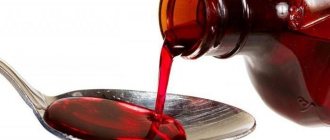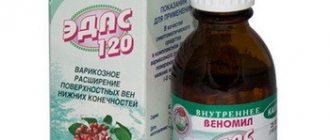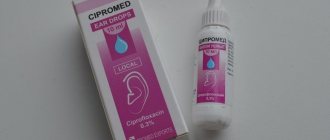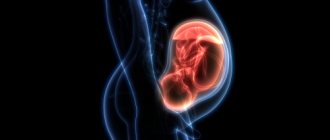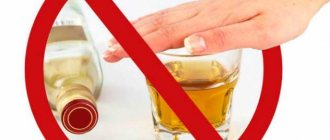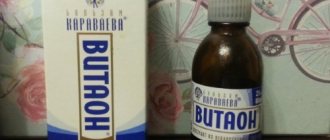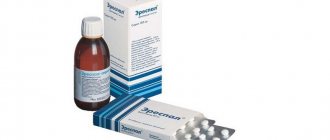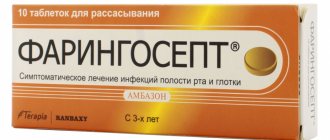Contraindications
Hypersensitivity to the existing components of the drug, fructose .
The syrup is not recommended for children under 3 years of age, as well as for patients with bronchial asthma , gastroesophageal reflux disease , gastritis with high acidity of gastric juice , gastric and duodenal ulcers, severe liver or kidney diseases.
Eucabal ointment is contraindicated for significant skin damage, acute skin diseases , high fever, infectious diseases, heart failure and hypertension .
Pharmacological properties of the drug Eucabal syrup
Combined preparation of plant origin. The effects inherent in its components are mutually potentiated. Thyme extract, due to the presence of phytoncides and phenols (thymol and carvacrol) in its composition, has a bactericidal effect against gram-positive coccal microflora and a bacteriostatic effect against gram-negative bacteria. In addition, phenols are active against fungi and antibiotic-resistant microbial flora, including L-forms of bacteria. The expectorant and secretolytic effects of thyme essential oil and flavonoids are due to the fermentation of thick viscous secretions and an increase in the motor activity of the ciliated epithelium. In most cases, the effect depends on the property of the surfactant essential oil to change the colloidal state of sputum. The antispasmodic effect of flavonoids provides moderate bronchodilation, facilitates breathing, and reduces expiratory shortness of breath. Plant mucins of plantain reduce irritation of the mucous membrane of the trachea and bronchi, and with their atrophic changes, reduce the intensity of a dry, unproductive cough. Phytoncides and phenols help to liquefy bronchial secretions, enhance its evacuation by the ciliated epithelium, reduce the severity of catarrhal phenomena in the respiratory tract, and also have an antimicrobial effect and protect the mucous membrane from irritation.
Instructions for Eucabal (Method and dosage)
Eucabal syrup, the instructions for which vary the dosage depending on age, involves taking the product undiluted after meals. Recommended doses:
- for children from 6 to 12 months. the dose is 1 teaspoon. l 1 time per day;
- under 6 months - 1 teaspoon. l 2 times a day;
- for schoolchildren - 1 table. l 2 times a day;
- for adults – 1-2 tables. l 3-5 times a day.
The duration of treatment must be determined individually, based on the severity of the condition and disease, for example, for mild forms it is up to 2 weeks plus 2-3 days after the complete disappearance of symptoms.
Eucabal balm, the instructions for which suggest not only external use - rubbing a 3-5 cm strip of balm on the chest and back, but also preparing steam inhalation (inhalation of vapors): stirring a 5 cm strip of balm in 2-3 tablespoons of hot boiled water.
The ointment is recommended for infants in the form of baths (estimated time of taking 10 minutes, contact with eyes should be avoided). To do this, add a 5-10 cm strip of balm to 20 liters of water at a temperature of 36-37 °C and stir evenly throughout the entire volume of water. They can be repeated until the symptoms disappear completely.
Release forms - syrup, balm, emulsion
The drug is available in the form of syrup for oral administration and emulsion (balm).
The syrup has the following features:
- contains plantain and thyme extracts;
- dark brown;
- sweet in taste (contains sugar);
- smells delicious.
Eucabal syrup is placed in bottles weighing 100 g. They are transported in cardboard boxes. The auxiliary components of the medicine are purified water, invert sugar (sucrose, fructose, dextrose), methyl 4-hydroxybenzoate and propyl 4-hydroxybenzoate.
Eucabal balm contains pine needle oil and eucalyptus oil. Per 100 g of solution there are 10 g of eucalyptus oil and 3 g of pine oil. This form of release is used during inhalation (administered through the respiratory tract in the form of a fine aerosol) and applied to the skin. It is possible to add emulsion to the bath.
The solution is light blue in color and has a specific eucalyptus odor. The excipients are glycerol monostearate, trometamol, purified water, guaiazulene, macrogol stearate, cetyl stearyl alcohol, citric acid and sodium cetyl stearyl sulfate.
Analogs
Level 4 ATC code matches: Cashnol
Anise oil
Bronchophyte
Pine buds
Pertussin
Bronchosan
Gedelix
Mixture for inhalation
Herbion ivy syrup
Herbion plantain syrup
Herbion primrose syrup
Mukaltin
Sinupret Forte
Dr. Theiss syrup with plantain
Bronchosept
Joset
Thermopsol
Tussamag
Marshmallow syrup
Dry cough syrup
- Tusavit
- Bronchodilator collection
- Altemix Broncho
Possible side effects of Eucabal
When consuming syrup, allergic reactions are sometimes observed. They manifest themselves in the form of exanthema (nodular or vesicular rashes) on the skin, urticaria, skin itching, redness, and diathesis. Atopic dermatitis may appear. Severe allergic reactions in the form of anaphylactic shock and Quincke's edema do not occur.
Side effects from the use of Eucabal balm include allergic reactions and increased symptoms of bronchospasm (manifested by difficulty breathing, whistling, wheezing, signs of tissue hypoxia and lack of air, coughing). In most cases, the medicine is well tolerated by patients.
Eucabal price, where to buy
The approximate price of the balm is 193 rubles, the price of the ointment is 125-130 rubles, the price of Eucabal syrup is 166-200 rubles.
- Online pharmacies in RussiaRussia
- Online pharmacies in UkraineUkraine
ZdravCity
- Eucabal balm with emulsion.
for in. and outside approx. 40ml Lichtenheldt GmbH/Esparma GmbH RUB 224 order - Eucabal syrup 100mlEsparma GmbH/Pharma Wernigerode GmbH
RUB 217 order
Pharmacy Dialogue
- Eucabal (cough syrup 100ml)Esparma
RUB 232 order
- Eucabal C emulsion for inhalation and external use 40mlEsparma
240 rub. order
show more
Pharmacy24
- Eucabal 100 ml syrup Pharma Wernigerode GmbH, Nimetchina
73 UAH.order - Eucabal 1 mg/ml 10 ml No. 1 spray Pharma Wernigerode GmbH, Nimecchina
56 UAH order
- Eucabal C balm 40 ml Lichtenheldt GmbH FF, Nimecchina
58 UAH order
- Eucabal 1 mg/ml 10 ml No. 1 drops Pharma Wernigerode GmbH, Nimecchina
40 UAH order
- Eucabal 0.5 mg/ml 10 ml No. 1 drops Pharma Wernigerode GmbH, Niemecchina
47 UAH order
Indications for use of Eucabal and main contraindications
The components contained in the syrup and balm (emulsion) have the following effects on the human body:
- act detrimentally against various bacteria (plantain and thyme);
- have an anti-inflammatory and healing effect (plantain contains pectin and tannins, polysaccharides, salicylic and benzoic acids, which suppress the inflammatory response);
- improve phagocytosis and promote the formation of interferon in the body (this speeds up recovery);
- have an antihypoxic effect (acids and flavonoids contained in plantain);
- promote expectoration of bronchial secretions (phytoncides, enzymes and plantain mucus);
- tone the body (oils);
- enrich tissues with oxygen.
Eucabal cough syrup is prescribed for pathology of the lower respiratory system, accompanied by sputum production (productive cough). The drug is used as an expectorant and anti-inflammatory agent. The mechanism of action is associated with increased bronchial peristalsis, activation of the ciliated epithelium, decreased sputum viscosity and easier elimination. Eucabal acts reflexively. Initially, the stomach receptors, which are reflexively connected to the bronchi, are irritated.
Indications for the use of syrup are:
- Tracheobronchitis. Combined inflammation of the mucous membrane of the trachea and bronchi. Often develops against the background of influenza and ARVI. It manifests itself first with a dry and then a wet cough, catarrhal symptoms (rhinitis, sore throat, sore throat), fever, and the release of mucopurulent or mucous sputum. Shortness of breath and chest pain may occur.
- Bronchitis. Diffuse inflammation of the bronchi. In the acute form, fever, general malaise, severe wheezing, a low chest cough that gets worse at night, pain in the muscles of the chest and abdomen, copious sputum production and a runny nose are observed.
- Tracheitis. Inflammation of the trachea, manifested by chest pain, paroxysmal, barking cough (with a bacterial infection, purulent sputum is often released), low-grade fever.
- Pneumonia (pneumonia). Develops against the background of bronchitis and ARVI. Characterized by severe symptoms of intoxication (fever, headache, chills, pain in muscles and chest), sweating, sleep disturbance, production of thick, rusty sputum (often with an unpleasant odor), cough.
- Broncho-obstructive syndrome. More often develops in children. It is characterized by the accumulation of sputum in the lumen of the bronchi and impaired ventilation. Manifested by noisy breathing, wheezing, coughing.
- Tuberculosis accompanied by cough with sputum. This is an infection caused by mycobacteria. Characterized by specific inflammation of the lung tissue. Manifested by cough, sweating, copious sputum production, hemoptysis, weakness, decreased performance, swollen lymph nodes, and malaise.
A contraindication to taking syrup is individual intolerance. Caution should be exercised in case of traumatic brain injuries (concussions, bruises, diffuse axonal damage), alcohol dependence, liver pathology (hepatitis, hepatosis, cirrhosis), diabetes mellitus, and adherence to strict diets with limited carbohydrates in the diet. The syrup is prescribed with caution to children and nursing women. Eucabal can be used during pregnancy with the permission of the attending physician.
The balm is prescribed to people suffering from laryngitis (inflammation of the larynx), pharyngitis (inflammation of the pharyngeal mucosa), rhinitis, nasal congestion and bronchitis. Eucabal emulsion, which can be used in the form of an aerosol, is contraindicated if a person has bronchial asthma, whooping cough, damaged skin (with external use of the drug), children under 2 months (for baths and rubbing), children under 5 years (for aerosol use) and with individual intolerance. Infants are not recommended to rub the balm into their facial skin.
Baths based on Eucabal emulsion are contraindicated for high blood pressure (above 139/89 mm Hg), heart rhythm disturbances, acute and chronic heart failure, angina pectoris, myocardial infarction in the decompensation stage, acute infections and febrile conditions.
